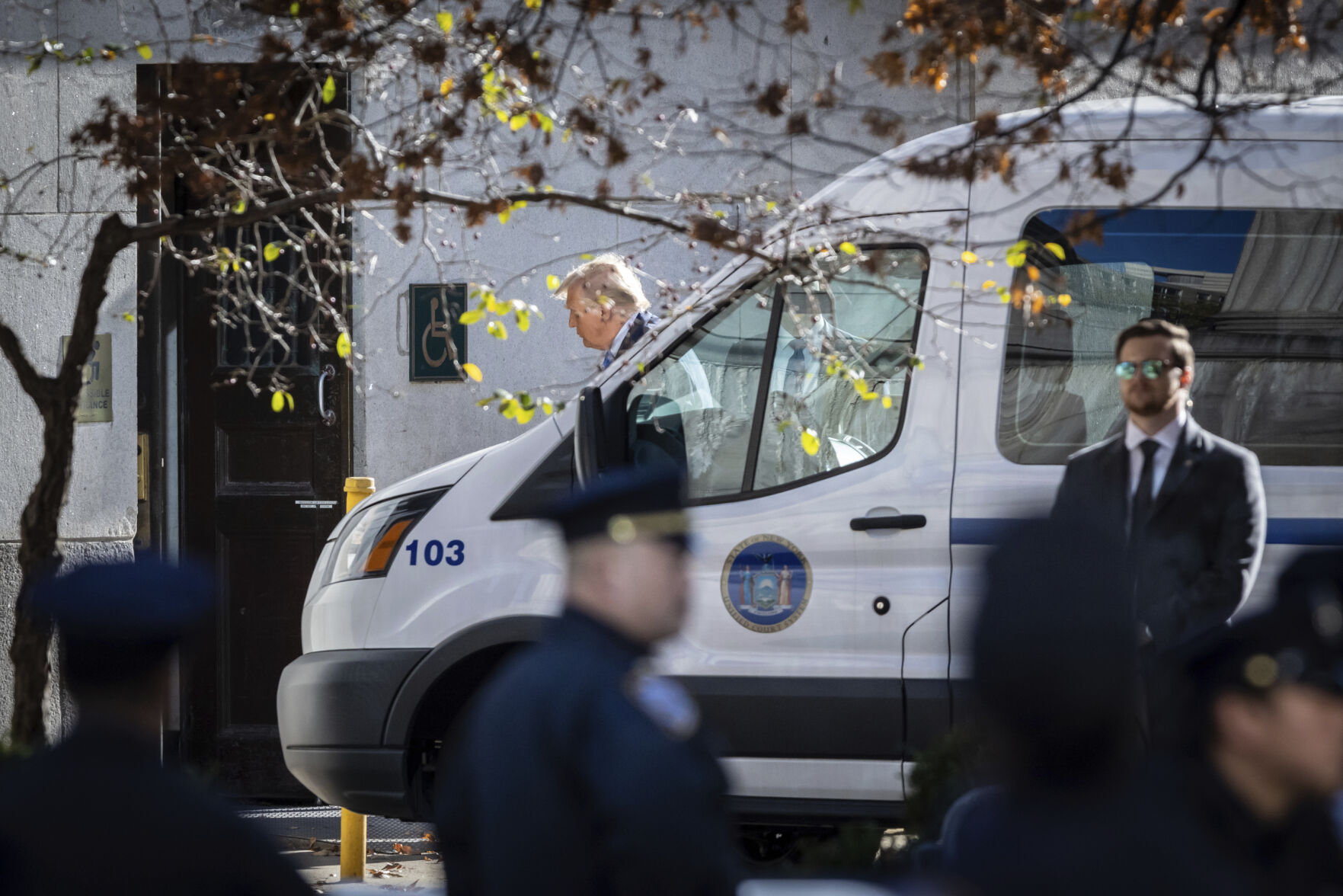NEW YORK — Donald Trump began testifying this morning in his civil fraud trial, producing a spectacle of a former president and the leading Republican presidential candidate defending himself against allegations that he dramatically inflated his net worth.
His turn on the witness stand, in a case that cuts to the heart of the business brand he spent decades crafting, amounts to a remarkable convergence of his legal troubles and his political ventures.
The testimony gives him the opportunity to try to use the witness stand as a campaign platform as he eyes a return to the White House while facing multiple criminal indictments, but its under-oath format, before a judge who has already fined him for incendiary comments outside of court, creates clear peril for a businessman and candidate famous for a freewheeling rhetorical display.
“It’s going to be a stunning moment. This is dramatic enough if he was simply an ex-president facing these charges. But the fact that he is the overwhelming favorite to run the GOP, it makes this a staggering Monday,” said presidential historian Douglas Brinkley.
Trump arrived in court soon before 9:30 today, posting social media broadsides earlier in the morning against the judge presiding over the case and the state attorney general’s office that brought the lawsuit.
“It is a very sad situation for our country,” he told reporters outside court, calling his critics thugs.
The courtroom at 60 Centre St. has already become a familiar destination for Trump. He has spent hours over the last month voluntarily seated at the defense table, observing the proceedings. Trump once took the stand — unexpectedly and briefly — after he was accused of violating a partial gag order. Trump denied violating the rules, but Judge Arthur Engoron disagreed and fined him anyway.
The vast majority of his speaking has happened outside the courtroom, where he has taken full advantage of the bank of assembled media to voice his outrage and spin the days’ proceedings in the most favorable way.
He will also be coming face-to-face again today with Engoron, whom he has lambasted on his social media site in recent days as a “wacko” and “RADICAL LEFT, DEMOCRAT OPERATIVE JUDGE” who has already “ruled viciously” against him.
Though Michael Cohen, his fixer-attorney-turned-witness, had initially said that he planned to also be in court, he told The Associated Press today that he would no longer attend because his presence created a potential security challenge.
Among the topics likely to be covered: Trump’s role in his company’s decision making, in its valuing of his properties, and in preparing his annual financial statements. Trump is likely to be asked about loans and other deals that were made using the statements and what intent, if any, he had in portraying his wealth to banks and insurers the way the documents did.
Trump is also likely to be asked about how he views and values his brand – and the economic impact of his fame and time as president — and may be asked to explain claims that his financial statements actually undervalued his wealth.
Trump has argued that disclaimers on his financial statements should have alerted people relying on the documents to do their own homework and verify the numbers themselves – an answer that he’s likely to repeat on the witness stand. Trump has said the disclaimer absolved him of wrongdoing.
Eric Trump, the former president’s middle son, who testified in the case last week, said his father was eager for his appearance on the stand.
“I know he’s very fired up to be here. And he thinks that this is one of the most incredible injustices that he’s ever seen. And it truly is,” the younger Trump told reporters Friday, insisting his family was winning even though the judge has already ruled mostly against them.
Unlike most Americans, Trump has ample experience fielding questions from lawyers and has a long history of depositions and courtroom testimony that offer insight into how he might respond. But Cohen, who worked for Trump for more than a decade, said nothing in Trump’s past has come close to what he’s facing now since they were largely civil matters “where even though the dollar amounts were in the millions of dollars, they were never of any real consequence to him or obviously to his freedom.”
“Right now this New York attorney general case is a threat to the extinction of his eponymous company as well as his financial future,” he said. Trump’s forthcoming criminal cases — accusing him of misclassifying hush money payments, illegally trying to overturn the result of the 2020 election and hoarding documents at his Mar-a-Lago club “have far more significant consequences, most specifically the termination of his freedom.”
Brinkley, the historian, said there was little precedent for Trump’s appearance, but said it won’t be the first time a past president has taken the stand in a trial accusing him of wrongdoing. He pointed to one case in 1915, when, after unsuccessfully running for a third term as a third-party candidate, former President Theodore Roosevelt was sued for libel for criticizing New York Republican Party boss William Barnes.
The judge eventually ruled in Roosevelt’s favor after a five week trial, in which the former president spent eight days on the witness stand.
“They were five weeks of great strain,” he wrote in a letter to his son. “But the result was a great triumph, and I am bound that there shall be no more libel suits as far as I am concerned, and for the present at least no further active participation in politics for me.”


